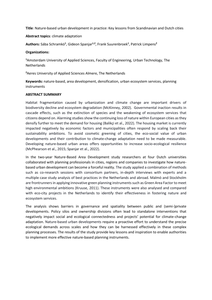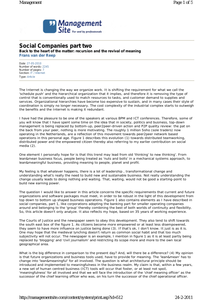The Internet is changing the way we organize work. It is shifting the requirement for what we call the ‘schedule push’ and the hierarchical organisation that it implies, and therefore it is removing the type of control that is conventionally used to match resources to tasks, and customer demand to supplies and services. Organisational hierarchies have become too expensive to sustain, and in many cases their style of coordination is simply no longer necessary. The cost complexity of the industrial complex starts to outweigh the benefits and the Internet is making it redundant.
MULTIFILE
Abstract from AMS Scientific Conference '24, Amsterdam, Netherlands.In the two-year Nature-Based Area Development study researchers at four Dutch universities collaborated with planning professionals in cities, regions and companies to investigate how nature-based urban development can become a forceful reality. The study applied a combination of methods such as co-research sessions with consortium partners, in-depth interviews with experts and a multiple case study analysis of best practices in the Netherlands and abroad.Keywords: nature-based, area development, densification, urban ecosystem services, planning instruments
DOCUMENT

In this chapter we present a study on the development of CSR Communication in social media of top European companies from 2012 to 2020
LINK
The Internet is changing the way we organize work. It is shifting the requirements for what we call the “schedule push” and the hierarchical organization that it implies, and therefore it is removing the type of control that is conventionally used to match resources to tasks, and customer demand to supplies and services. Organizational hierarchies have become too expensive to sustain, and in many cases their style of coordination is simply no longer necessary. The cost complexity of the industrial complex starts to outweigh the benefits, and the Internet is making it redundant. The question I put forward in this Article, after a short description of how I envision “the change,” is what new requirements should be met by software in order to meet the requirements of the networked economy. Business will develop from Business-to-Consumer (B2C) to Consumer-to- Business (C2B) to People-to-People (P2P), customers more and more taking control over business activities, overhead being replaced by customer focus. This is also a new reality for the software world.
DOCUMENT

The Internet is changing the way we organize work. It is shifting the requirement for what we call the ‘schedule push’ and the hierarchical organization that it implies, and therefore it is removing the type of control that is conventionally used to match resources to tasks, and customer demand to supplies and services. Organizational hierarchies have become too expensive to sustain, and in many cases their style of coordination is simply no longer necessary. The cost complexity of the industrial complex starts to outweigh the benefits and the Internet is making it redundant.
MULTIFILE

The emergence of organic planning practices in the Netherlands introduces new, non-conventional, local actors initiating bottom-up urban developments. Dissatisfied with conventional practices and using opportunities during the 2008 financial crisis, these actors aim to create social value, thus challenging prevailing institutions. Intrigued by such actors becoming more present and influential in urban planning and development processes, we aim to identify who they are. We use social entrepreneurship and niche formation theories to analyse and identify three types of social entrepreneurs. The first are early pioneers, adopting roles of a developer and end-user, but lacking position and power to realize goals. Secondly, by acting as boundary spanners and niche entrepreneurs, they evolve towards consolidated third sector organizations in the position to realize developments. A third type are intermediate agents facilitating developments as boundary spanners and policy entrepreneurs, without pursuing urban development themselves but aiming at realizing broader policy goals. Our general typology provides a rich picture of actors involved in bottom-up urban developments by applying theories from domains of innovation management and business transition management to urban planning and development studies. It shows that the social entrepreneurs in bottom-up urban development can be considered the result of social innovation, but this social innovation is set within a neoliberal context, and in many cases passively or actively conditioned by states and markets.
MULTIFILE

A social media architect is an appealing new profession that entails crossovers between communication and IT & Design. There are no study programmes for this job. Important questions are how to interest secondary school pupils for such a new job, and how to prepare them for these jobs or jobs that do not even exist today? This research aims to set an example by presenting a realistic job profile of a social media architect by linking the ‘21st century skills’ to the context in which he/she operates.
DOCUMENT

Binnen het projectonderwijs wordt nog vaak drooggezwommen. Enerzijds door de verstrekte projectopdrachten anderzijds door de suboptimalisatie van oplossingen. Deze zijn namelijk sterk afhankelijk van de verbonden modules en docenten. In de praktijk zijn de oplossingen echter altijd een afweging van tijd, geld en kwaliteit. Onze Human Engineers leren om daar op een goede manier mee om te gaan. Dit door de integratiemodule Integrated Product Development (IPD). IPD is een multidisciplinair project waarbij studenten van verschillende Fontys Instituten werken aan de commercikle en technische uitwerking van een bedrijfsopdracht. Marktonderzoek, doelgroep bepaling en productspecificatie zijn een vast onderdeel van een IPD project evenals het ontwerpen en bouwen van een prototype en het financieel onderbouwen van een Go/NO go advies aan de ondernemer. Het project vindt plaats in het laatste onderwijssemester, net vssr het afstuderen en is dus te zien als een open project met een bedrijf als opdrachtgever. De Human Engineering studenten zijn in deze projecten de verbindende schakel. De specialisten in de projectgroepen, de technische studenten, willen nogal eens zoeken naar mooie oplossingen vooral in technische zin. Daarbij gaan ze vaak volledig voorbij aan het belang van de ondernemer (winst maken) en het belang van de klant (kwaliteit en bedieningsgemak). Ook het projectwerk heeft een enorme sprong vooruit gemaakt door het team uit te breiden met Human Engineers. De Human Engineering studenten focussen vooral ook op het halen van targets (kosten) en deadlines (tijd), het maken en nakomen van afspraken en de communicatie binnen de groep en naar buiten toe (ondernemer en klant). Huidige studenten en alumni geven aan dat het project zeer realistisch is en dat het vergelijkbaar is met problemen die ze in hun werk tegen komen. Zeker blijven doen is hun advies. Organisatorisch vergt het wel een en ander omdat er bijvoorbeeld afstemming dient te komen tussen de verschillende instituten met betrekking tot: beoordeling van de studenten, afstemmen van lesroosters en vergoeding voor docenten. Ook het onderhouden van bedrijfsrelaties om bijvoorbeeld aan de opdrachten te komen blijft een moeilijke, tijdrovende zaak.
DOCUMENT
This research aims to contribute to a better understanding of strategic collaborations between work-integration social enterprises (WISEs) and for-profit enterprises (FPEs) with the joint objective to improve labour market opportunities for vulnerable groups. We find that most collaborations strive towards integration or transformation in order to make more social impact.
LINK
Social enterprises are the organizations founded, owned, and/or managed by the social entrepreneur(s). Their organizations can take different (sometimes multiple) legal forms, such as foundations, cooperatives, or limited liability companies. Some countries introduced separate organizational forms to do justice to the dual mission of social enterprises, such as low-profit limited liability company (L3Cs), benefit corporation (B-Corps), and community interest company (CICs) (Ebrahim et al. 2014). This is to create an enabling environment for social enterprises in which they can operate.The next section (section “The Drivers of Social Entrepreneurship”) explains the drivers for social entrepreneurship and the reason for the current interest in the phenomenon. This is followed by a conceptualization of the multidimensional concept of social entrepreneurship and its subconcepts in section “Social Entrepreneurship and Its Subconcepts.” Subsequently, section “Contributing to Sustainable Development Goals” explains how social enterprises contribute to the sustainable development goals by solving societal problems and scaling for impact. It further goes into detail about the role of the social entrepreneur in this process. The conclusion is drawn in section “Conclusion,” which is followed by an agenda for future directions, specified for each of the subconcepts of social entrepreneurship in section “Future Directions.”
DOCUMENT